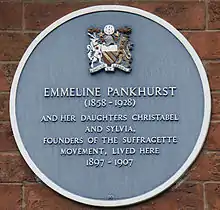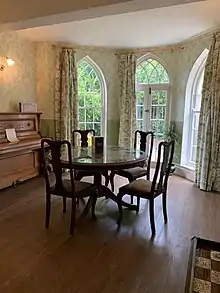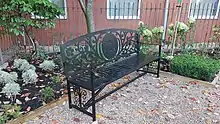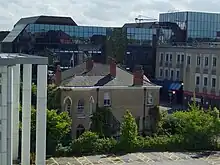Pankhurst Centre
The Pankhurst Centre, 60–62 Nelson Street, Manchester, is a pair of Victorian villas, of which No. 62 was the home of Emmeline Pankhurst and her daughters Sylvia, Christabel and Adela[1] and the birthplace of the suffragette movement in 1903.[2]



Description
The Pankhurst's villas now form a centre that is a women-only space which creates a unique environment for women to learn together, work on projects and socialise. It is a Grade II* listed building as of 10 June 1974.[3]
Part of the centre is a museum, The Pankhurst Parlour, which has become a memorial to the suffragette movement. Its Edwardian style furnishings evoke the home of Mrs Pankhurst and her daughters. It is the only museum dedicated to telling the story of women's fight for the right to vote.
The Women's Social and Political Union was founded in the parlour of Emmeline Pankhurst's home in October 1903.
The Pankhurst Centre is run by volunteers and receives no public funding, relying solely on donations. The Representation of the People Act 1918 gave the vote to all men aged 21 and over and women aged 30 and over who met certain property qualifications. In its centenary year calls were made to fund the Pankhurst Centre to make it a major museum that tells the story of women's suffrage and the women's rights movement.[4]
History
62 Nelson Street was the home of Emmeline Pankhurst at the time she founded the Women's Social and Political Union in 1903.[3] She moved there after the death of her husband, Richard Pankhurst in 1898.
The site became a grade II* listed building in 1974. In 1978, there was an application submitted to demolish the building, sparking a notable protest to keep the building as a museum and centre committed to women's issues.
The Parlour was the first room in the Pankhurst Centre to be redecorated and was the centre of attraction when Barbara Castle and Helen Pankhurst opened the centre on 10 October 1987.
The Centre would merge with Manchester Women's Aid in 2014 to offer women's charity services.[5]
The Pankhurst Centre suffered a break-in on 1 October 2019. Since then, donations have been made to repair the damage, including £10000 from The Cooperative Group.[6]
The centre reopened on the 29th of August, 2021 after a major redevelopment project in the two galleries and the parlour during 2020.
Pankhurst Centre Garden
In 2018, a newly designed garden, designed by Janet Leigh (a garden designer based in Stockport), was opened at the Pankhurst Centre in September 2018. The garden to mark the centenary of Votes for Women, and acknowledges the work of suffragettes. The garden was funded by an outsourcing campaign, with over 500 people contributing over £24,000 in 2017. The garden also provides a relaxation space for the women and children residents of Manchester Women's Aid.[7]
See also
- Grade II* listed buildings in Greater Manchester
- Listed buildings in Manchester-M13
- List of monuments and memorials to women's suffrage
 Opening of Pankhurst Centre Garden, September 2018
Opening of Pankhurst Centre Garden, September 2018
References
- Hartwell 2001, p 320
- Anon. "The Pankhurst Centre". The Pankhurst Centre. Archived from the original on 3 September 2004. Retrieved 8 February 2012.
- "The Pankhurst Centre 62, Manchester". British Listed Buildings.
- Perraudin, Frances (31 December 2017). "Pankhurst Centre needs public funding, say women's rights activists". The Guardian. Retrieved 9 October 2018.
- "History of the Building". The Pankhurst Centre. Retrieved 14 April 2023.
- "Vandalised museum handed £20k to fund for repairs". 7 October 2019. Retrieved 9 October 2019.
- "Hundreds of supporters bring Pankhurst Garden to life". Visit Manchester. Retrieved 9 October 2019.

Further reading
- Hartwell, Clare (2001), Manchester, Pevsner Architectural Guides, London: Penguin, ISBN 0-14-071131-7
External links
- Pankhurst Trust - official site
- Background information on the Centre
- www.pankhurstmuseum.com/ - museum site





